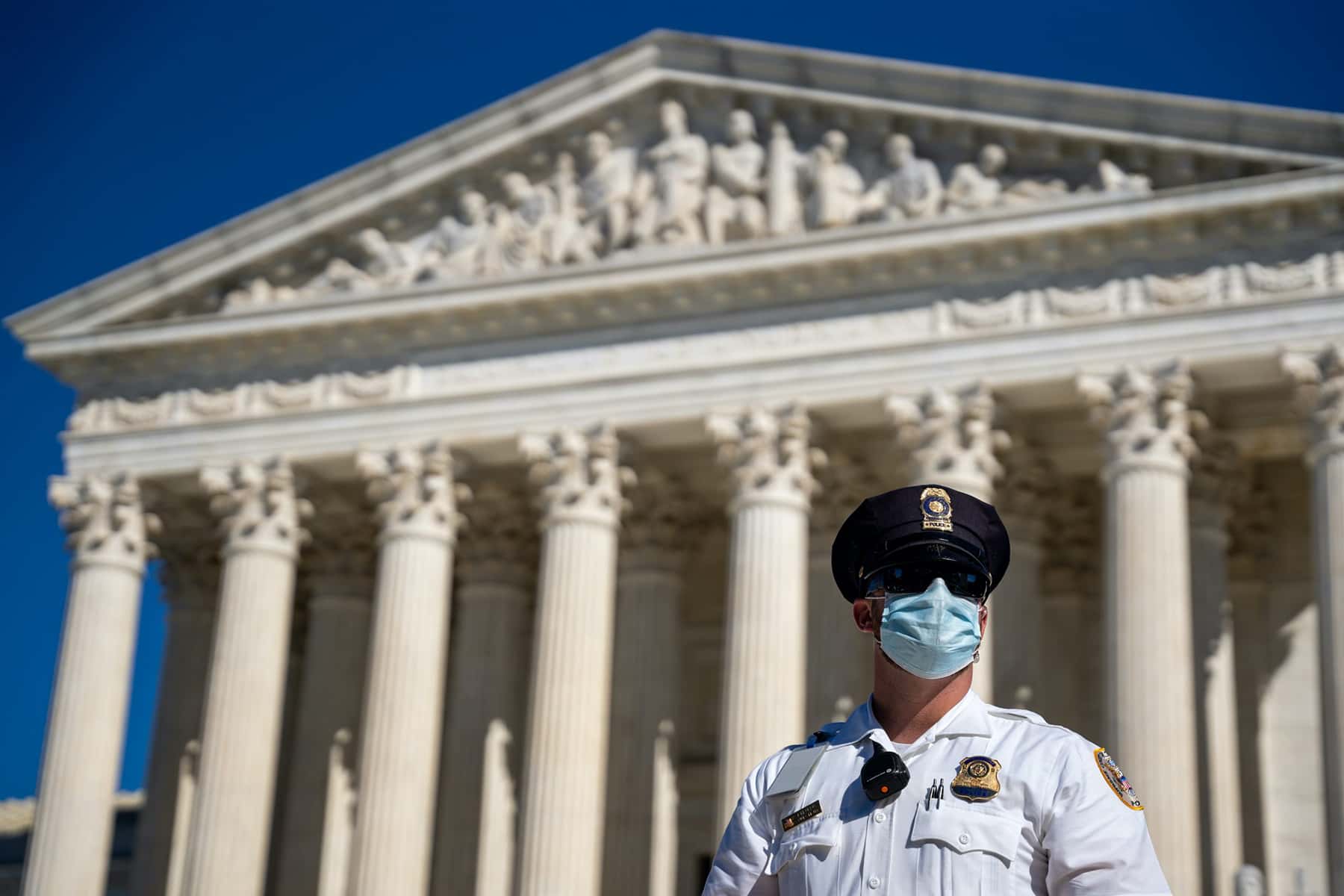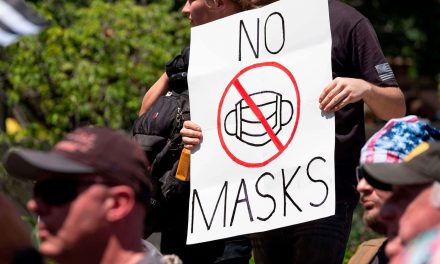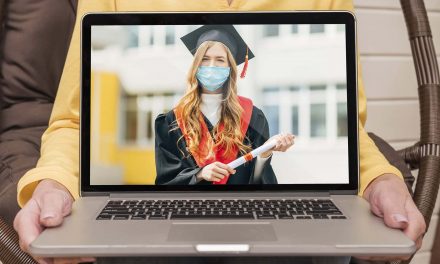
On January 13, by a vote of 6 to 3, the U.S. Supreme Court struck down the Biden administration’s requirement that businesses with more than 100 employees address the coronavirus pandemic by making employees either get vaccines or, if they choose not to be vaccinated, to test weekly and wear a mask at work. Employees who work exclusively at home or mostly outside were exempted from the requirement, as were those with a religious exemption.
President Joe Biden took office vowing to get the coronavirus pandemic under control. By April 2021, his administration’s efforts to make vaccines available and get them into people’s arms were so successful that in early May he vowed to reach a 70% vaccination rate among those then eligible for the vaccine by July 4. Promptly, political opponents began to undermine confidence in the vaccine, and vaccination rates fell off dramatically.
In July, the administration tried to encourage vaccinations by requiring vaccines or testing for federal workers and for those contracting with the federal government. In November, the administration expanded those requirements with a new one under the authority of the Occupational Safety and Health Administration (OSHA), established in the Department of Labor under Republican President Richard M. Nixon in 1970 to “assure safe and healthy working conditions for working men and women by setting and enforcing standards and by providing training, outreach, education and assistance.” OSHA announced a vaccine or testing requirement for businesses with more than 100 employees.
The mandate would have covered about 84.2 million Americans (our population is about 332 million). OSHA estimated (before Omicron) that the rule would save 6,500 lives and prevent 250,000 hospitalizations over a six-month period.
Employers claimed that the mandate would cost billions of dollars to implement and hundreds of thousands of employees would quit (although the actual numbers of those quitting their jobs over vaccine mandates turned out to be significantly lower than threatened). A number of Republican-dominated state legislatures, including those of Arkansas, Florida, Iowa, Kansas, and Tennessee, fought the mandate by extending unemployment benefits to those fired for refusing to get the vaccine.
Those objecting to the mandate got the extremely conservative U.S. Court of Appeals for the Fifth Circuit, which covers Louisiana, Mississippi, and Texas and which Trump skewed even more extremely to the right, to stop it. The Sixth Circuit Court of Appeals, also right-leaning but less extreme, lifted the stay, permitting the rule to go into effect. Now, in a case titled National Federation of Independent Business v. Department of Labor, the Supreme Court has restored the stay.
The six justices in the majority ruled that OSHA did not have the authority to require vaccinations or masks and testing because the coronavirus is not specific to the workplace. OSHA’s responsibility is only to make sure that conditions related to the workplace are safe; it cannot regulate a workplace for a virus that is everywhere, even if people catch it at work.
The three justices who dissented, Justices Stephen Breyer, Sonia Sotomayor, and Elena Kagan, seemed incredulous:
“COVID-19 poses grave dangers to the citizens of this country—and particularly, to its workers,” they wrote. “The disease has by now killed almost 1 million Americans and hospitalized almost 4 million. It spreads by person-to-person contact in confined indoor spaces, so causes harm in nearly all workplace environments. And in those environments, more than any others, individuals have little control, and therefore little capacity to mitigate risk. COVID-19, in short, is a menace in work settings. The proof is all around us: Since the disease’s onset, most Americans have seen their workplaces transformed. So the administrative agency charged with ensuring health and safety in workplaces did what Congress commanded it to: It took action to address COVID-19’s continuing threat in those spaces.”
At stake in the case is not only many thousands of American lives and restoring the stability of society, but also the same issue at the heart of our current struggle over voting rights: the relationship of the federal government to the states.
Justices Neil Gorsuch, Clarence Thomas, and Samuel Alito began their decision opposing the mandate by saying, “The central question we face today is: Who decides?” Can a federal agency charged with workplace safety mandate vaccines, or should the work of combating coronavirus belong to state and local governments and Congress?
The right-wing justices came down firmly against the federal government, using two doctrines that, if fully deployed, will destroy the modern U.S. system.
In his opinion, Gorsuch explicitly raised the concept of the “nondelegation doctrine” and the related concept of the “major questions doctrine.” The nondelegation doctrine relies on our government’s separation of powers. It says that, as its own branch of government, Congress cannot delegate regulatory authority to the executive branch, where agencies like OSHA live.
But, since Congress has, in fact, been delegating authority to the executive branch since the administration of President George Washington, those who want to reduce federal authority sometimes rely instead on the more limited major questions doctrine, which says that although Congress can delegate minor authority to administrative agencies, it cannot delegate major questions (although just how to define a major question is unclear).
A recent study by University of Southern California professor of public policy Dr. Pamela Clouser McCann and University of Michigan professor of social science Dr. Charles R. Shipan, both experts on intergovernmental delegation, found that 99% of today’s federal laws involve delegation. Unwinding them and requiring Congress to make all its own regulatory decisions would paralyze the modern government.
Those who support the idea of nondelegation argue that it guarantees government by the people rather than by an unelected bureaucracy, and this is a worthy thought. But unfortunately, it depends on the goodwill of those elected to state legislatures, and because those lawmakers also get to decide who votes in their states, that goodwill can be thin on the ground.
At heart, this is the same states’ rights argument that the U.S. has grappled with since the 1830s. Since that time, while some state legislatures have used their power to reflect the will of the people, others have limited the vote, putting a small group of people into power. Once in power, they have used the state government to promote their own interests. States’ rights advocates have consistently said that any federal interference with a state’s unfair laws is tyranny.
Since the 1930s, though, lawmakers have used the federal government to combat unfair state laws. They have regulated businesses when state lawmakers wouldn’t, protected civil rights from discriminatory state laws, and, ultimately, guaranteed the right to vote in states that kept their citizens from the polls, with the expectation that if everyone could vote, they would, indeed, create state governments that reflected the will of the majority.
The Supreme Court — which, in an ironic echo of Gorsuch’s complaints about unelected bureaucrats, is not elected — is working with today’s Republicans to dismantle this modern system, embracing the nondelegation doctrine to undercut federal regulation, even though this decision clearly will cost American lives.
The court upheld a mandate from the Department of Health and Human Services requiring vaccination for healthcare workers in facilities that accept Medicare and Medicaid, both of which are funded by the federal government. It supported that mandate only by a vote of 5 to 4; four of the justices did not believe the Department of Health and Human Services has the right to require vaccines in a healthcare facility.
Meanwhile, Biden deployed another 1000 military personnel to hospitals, which are overwhelmed with unvaccinated coronavirus patients.
Letters from an Аmerican is a daily email newsletter written by Heather Cox Richardson, about the history behind today’s politics














